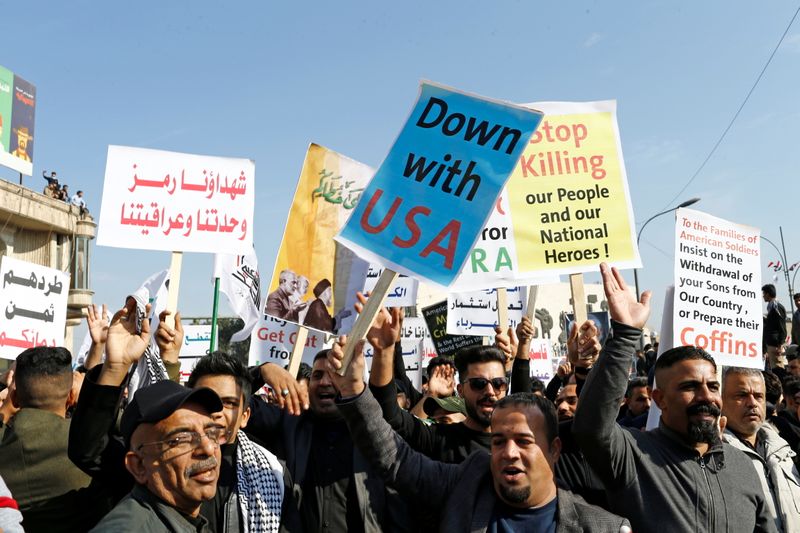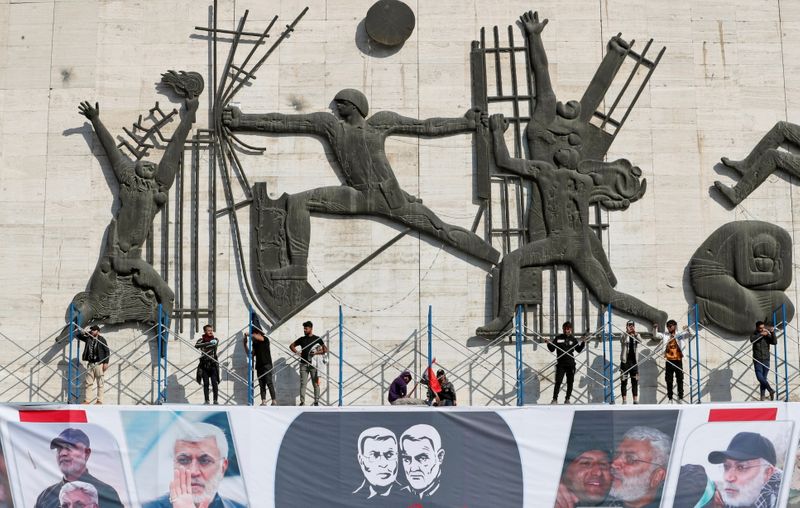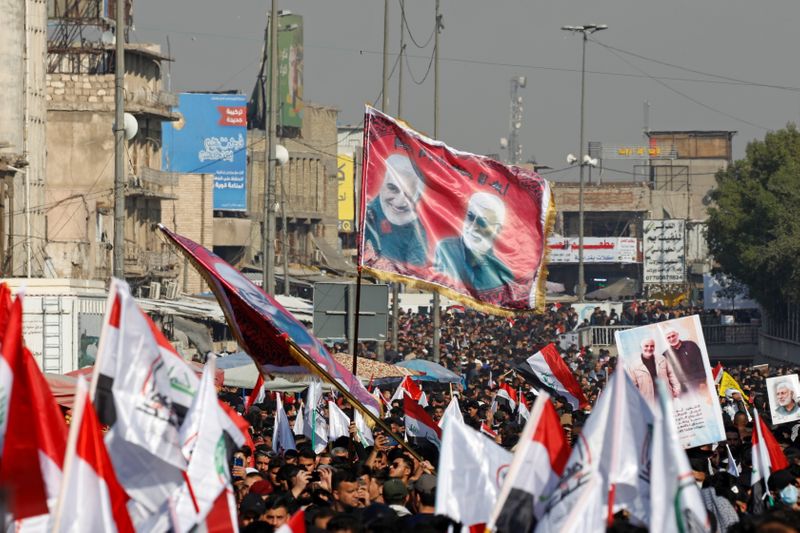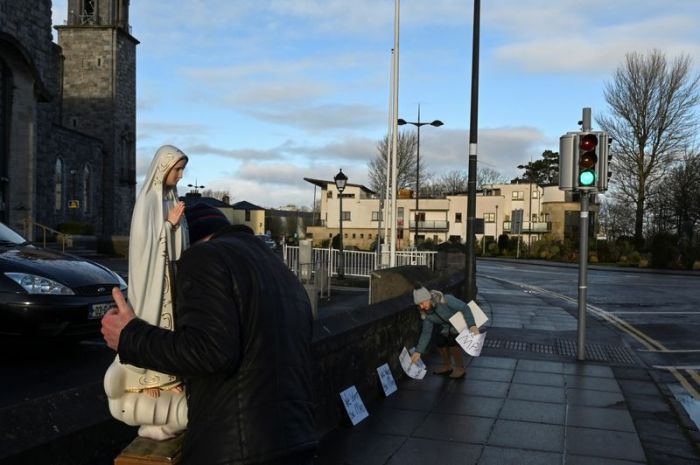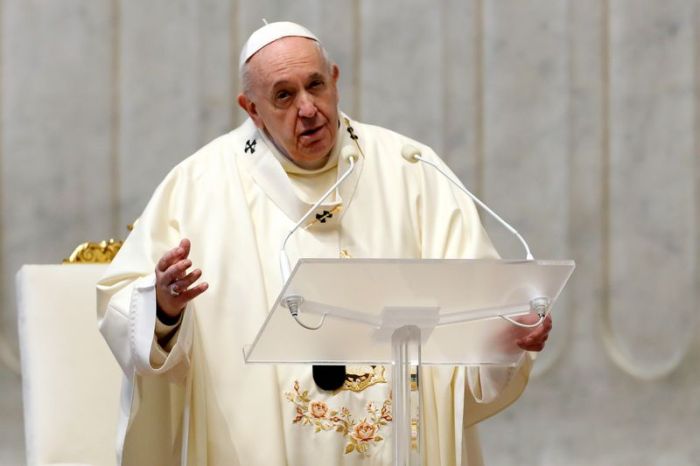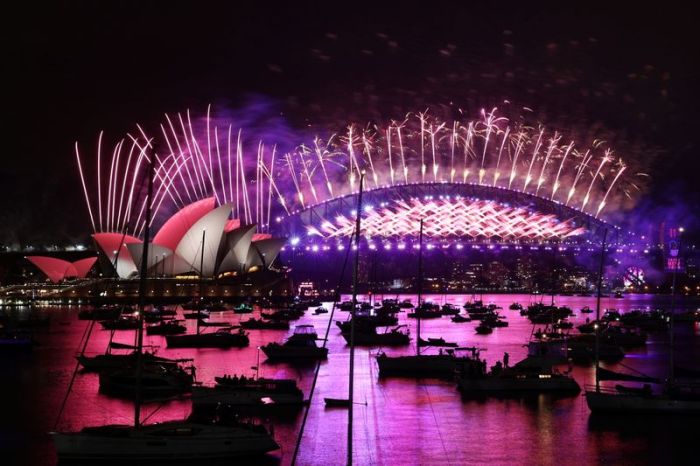BAGHDAD (Reuters) -Tens of thousands of supporters of Iranian-backed Iraqi paramilitary groups chanted anti-American slogans in central Baghdad on Sunday to mark the anniversary of the U.S. killing of Iranian general Qassem Soleimani and an Iraqi militia commander.
The gathering coincided with increasing tensions between Iran and the United States in the last days of President Donald Trump’s administration, and many in the crowd demanded revenge.
Soleimani, head of an elite overseas unit of Iran’s Revolutionary Guards, was killed along with Iraqi militia leader Abu Mahdi al-Muhandis on Jan. 3, 2020, in a U.S. drone strike on his convoy at Baghdad airport.
Washington had accused Soleimani of masterminding attacks by Iranian-aligned militias on U.S. forces in the region, and his killing took U.S.-Iranian hostilities into uncharted waters and stoked concern about a major conflagration.
Demonstrators gathered on Sunday in central Tahrir square in response to calls by an array of militia groups known collectively as the Popular Mobilisation Forces (PMF), which are mostly backed by Iran.
They waved the Iraqi and PMF flags and chanted anti-American slogans such as “America is the Great Satan”, while carrying the portraits of Soleimani and Muhandis.
Big posters of the two men along with others killed in the attack were everywhere around the square and hung on adjacent buildings.
PMF head Faleh al-Fayyad and politician Hadi al-Ameri, commander of the Badr Organization militia, who were both at the rally addressing the crowds, called for the expulsion of U.S. troops.
The leader of the Tehran-backed Lebanese organization Hezbollah said in a televised speech later on Sunday that Soleimani’s killing caused serious repercussions in the region.
“Removing America from the region … would not have been a serious and a declared goal that the people in region must work towards (achieving) if it weren’t for this historical incident,” Sayyed Hassan Nasrallah said, adding that Iran is strong and capable of responding militarily.
REGIONAL STRAINS
“We are here today to condemn what the American-Israeli enemy had done by targeting the leaders of victory,” protester Abu Ahmed said in Baghdad.
“We call on the government to take a serious stance to hold those who killed them accountable.”
Reflecting continuing regional strains, Iranian Foreign Minister Mohammad Javad Zarif on Saturday urged Trump not to be “trapped” by an alleged Israeli plan to provoke a war through attacks on U.S. forces in Iraq.
An Israeli official dismissed the accusation as “nonsense” and said it was Israel that needed to be on alert for possible Iranian strikes.
While no attacks occurred against U.S. forces or diplomats on Jan. 3 in Iraq, American officials say they remained concerned about advanced planning for potential attacks.
On Sunday, Acting U.S. Defense Secretary Chris Miller said he was reversing his decision to send the aircraft carrier Nimitz back to it’s homeport.
“Due to the recent threats issued by Iranian leaders against President Trump and other U.S. government officials, I have ordered the USS Nimitz to halt its routine redeployment,” Miller said.
A U.S. official, speaking on the condition of anonymity, said the carrier was expected to stay outside the Arabian Sea.
The official said the Pentagon’s move appeared to be more precautionary than a response to specific new intellegence.
The United States blames Iran-backed militias for regular rocket attacks on U.S. facilities in Iraq. No known Iran-backed groups have claimed responsibility.
The U.S. military flew two nuclear-capable B-52 bombers to the Middle East in a message of deterrence to Iran last week, but the bombers have since left the region.
On Saturday evening thousands of mourners gathered on the highway that leads to Baghdad airport in a simulated funeral procession in tribute to Soleimani and Muhandis.
(Reporting by Maher NazehAdditional reporting by Laila Bassam in Beirut and Idrees Ali in Washington. Writing by Amina IsmailEditing by William Maclean and Frances Kerry)

